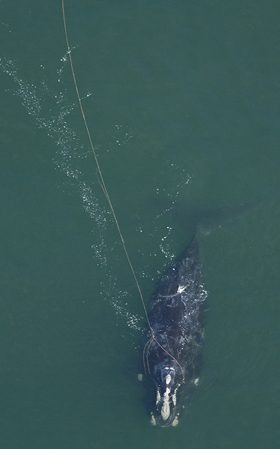


Campobello Whale Rescue Team
1-866-567-6277
Quebec Marine Mammal Emergency Response Network
1-877-7baleine (1-877-722-5346)
Marine Animal Response Society in Nova Scotia
1-866-567-6277
Whale Release and Stranding Group in Newfoundland and Labrador
1-888-895-3003 (Toll-free in Newfoundland and Labrador)

Necropsies performed on right whale carcasses have shown that 12% of all known mortalities are due to entanglement in fishing gear 1. Furthermore, that percentage is underestimated due to the fact that death from entanglement often occurs after many months or even years, resulting in an emaciated whale that is likely to sink after death and thus the carcass is never recovered and recorded. Even though they are not all seen carrying gear, analysis of photographs from right whales shows that 75% of all known individuals have entanglement scars 2.

The Campobello Whale Rescue Team during a disentanglement attempt.
Attempts to reduce the number of mortalities due to entanglement have contributed to the development of emergency networks. On the Atlantic coast, whale rescue began in 1978 with Jon Lien and the Whale Research Group at Memorial University helping Newfoundland fishermen remove humpback whales from cod traps. In 1984 researchers at the Provincetown Center for Coastal Studies (PCCS, Massachusetts) began applying the disentanglement techniques developed by Dr. Jon Lien to disentangle whales in the Cape Cod area. In 1994, a disentanglement network was created by PCCS in the United States and then expanded to Canada under a Memorandum of Understanding between PCCS and Fisheries and Ocean Canada to facilitate the coordination and response during rescue attempts.

Aerial view of an entangled right whale.
In Eastern Canada, the Campobello Whale Rescue team first started responding to whales in distress in 2002 and currently responds to most of the entanglement cases in the Bay of Fundy region. The team is an integral part of the United States Atlantic Large Whale Disentanglement Network (ALWDN), which includes the Provincetown Center for Coastal Studies, the New England Aquarium, the Grand Manan Whale and Seabird Research Station and Fisheries and Oceans Canada. Members of the team include fishermen and whale biologists who volunteer their time to participate in the recovery of the species.
In Newfoundland, marine mammals in distress are dealt with by the Whale Release and Strandings Group, assuming the work begun by Dr. Lien and associates in 1978.
In 2004, the Quebec Marine Mammal Emergency Response Network was created to, among other things, respond to whales in distress in the Quebec region, which includes the St. Lawrence Estuary and the Gulf of St. Lawrence. The network involves ten partners including the Biodôme de Montréal, Fisheries and Oceans Canada, Parks Canada, the Parc Aquarium du Québec, the Group for Research and Education on Marine Mammals (GREMM), the Mingan Island Cetacean Study (MICS), the Réseau d’observation des mammifères marins (ROMM), the Centre Québécois pour la santé des animaux sauvages (CQSAS) and the St. Lawrence National Institute of Ecotoxicology, Quebec-Labrador Foundation and Amphibia-Nature.
More detailed information can be found on the Whale Rescue page in the Stewardship section.

1 Kraus, S. D., M. W. Brown, H. Caswell, C. W. Clark, M. Fujiwara, P. K. Hamilton, R. D. Kenney, A. R. Knowlton, S. Landry, C. A. Mayo, W. A. McLellan, M. J. Moore, D. P. Nowacek, D. A. Pabst, A. J. Read, and R. M. Rolland. 2005. North Atlantic right whale in crisis. Science 309:561-562.
2 Knowlton, A. R., M. K. Marx, H. M. Pettis, P. K. Hamilton, and S. D. Kraus. 2005. Analysis of scarring on North Atlantic right whales (Eubalaena glacialis): Monitoring rates of entanglement interaction: 1980-2002. Final Report to the National Marine Fisheries Service. 20 pp.

